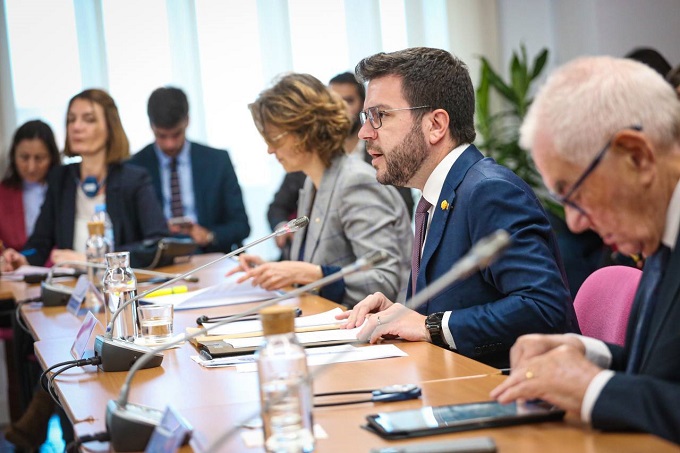- The President of the Government of Catalonia and Minister Serret met this morning in Madrid with the delegation of MEPs investigating the use of Pegasus spyware
- Aragonès has demanded that “justice be done” and “explanations be given” and has assured that those affected will find “better protection in the European institutions than in those of the State”

This morning, the President of the Government of Catalonia, Pere Aragonès i Garcia, denounced the fact that "the Spanish State has abandoned the victims" of the espionage carried out using Pegasus spyware, in what he described as "another episode of the dirty war against those of us who defend Catalonia's independence". "A democratic state does not spy on citizens or democratic political movements", said the President at the meeting he held in Madrid with the delegation of MEPs investigating the use of Pegasus and equivalent spyware surveillance software.
Aragonès, together with the Minister for Foreign Action and European Union, Meritxell Serret i Aleu, attended the meeting as victims of espionage to explain their case to the nine MEPs, led by the PEGA Committee of Inquiry Chair, Jeroen Lenaers.
"The fact that today we are appearing before the European Parliament's Committee of Inquiry and not before a committee of the Spanish Congress and Senate is an example of how Spain has abandoned the political leaders whose privacy has been violated for the simple fact of defending Catalonia's independence", he said in statements to the media before entering the meeting.
During his appearance, the president regretted that even today "there has been no clear response from the State's institutions as to why, nor has there been an offer of an appeal for constitutional protection of our fundamental rights" in response to the complaints of those affected.
"Some people believe that the defence of Spain's unity is above observing fundamental rights and, for us, fundamental rights always come before any political project", he added.
In this sense, Aragonès has denounced before the MEPs that the Spanish State has acted "in denial of the evidence" and has asked that "it gives the explanations it has yet to give". "There has been no accountability and there are still many questions to be answered", he said.
As such, Aragonès insisted that the resignation of the head of the CNI is not enough and demanded that "justice be done, [...] because if this scandal goes unpunished, doubts about the fragile democratic quality of the Spanish State will not cease to multiply". What's more, if we do not get to root of all the spying, "who is to say I am not still being spied on"?
Faced with the inaction of the Spanish authorities, President Aragonès expressed his gratitude that "the European Parliament is doing what neither the Spanish Congress of Deputies nor the Spanish Senate has been able to do", which is "to give the victims the opportunity to be heard and listened to". "We know that we will find true action and better protection in the European institutions than in those of the State", he assured, imploring them to get to the bottom of Catalangate.
Finally, the President appealed to "the right to know, to know the truth, and for the judicial system to take this espionage case seriously", because "it is the first step in repairing all the damage that has been done".
In turn, Minister Meritxell Serret underlined the cross-border dimension of her case: she was spied on when she was a Belgian resident and had a Belgian telephone, and when she was a Catalan Government delegate to the European Union and had dealings with the EU bubble. Serret insisted that "it is neither a Catalan nor a Spanish case, it is a European case". "In politics, and especially in a democracy, not everything goes. And in Spain, a Member State of the European Union, red lines have been crossed", she said. The Minister also wanted to highlight the defenselessness of the victims because, "who should protect us is precisely the one who spies on us", and called for the need to establish a national and international protection framework that regulates the use of these programs from a human rights perspective.
Geneva Declaration
Last September, in the wake of the Pegasus espionage affair, the Catalan Government promoted the Geneva Declaration on Targeted Surveillance and Human Rights, together with the NGO Access Now, to move towards the international regulation of surveillance technologies. Taking into account the recommendations of UN experts to achieve a global moratorium on spyware technology and the diligent work of civil society, the Geneva Declaration is a collective commitment to stop the proliferation of the use of surveillance technologies.